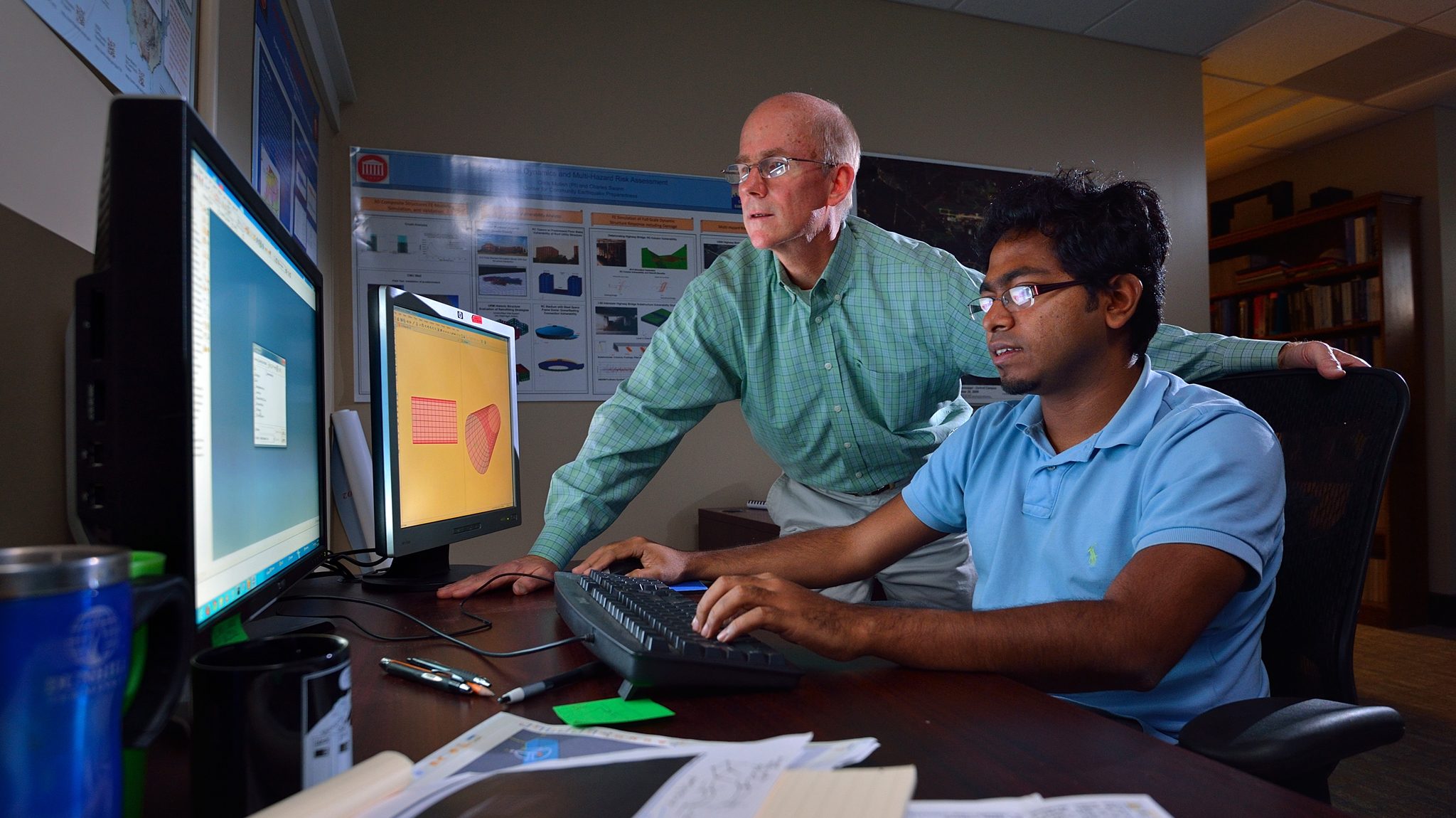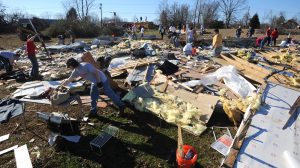
UM civil engineering professor Chris Mullen (left) discusses his research with one of his students. Mullen has studied tornadoes extensively and offers advice on how to survive them. Photo by Robert Jordan/Ole Miss Digital Imaging Services
OXFORD, Miss. – Even with tracking devices and weather alerts, no one can predict exactly when and where a tornado might touch down. But University of Mississippi experts say simple preparations before a natural disaster can mean the difference between life and death.
Chris Mullen, an Ole Miss civil engineering professor, has studied tornadoes and other natural disasters extensively for several years. A founding member of the Disaster Resistant University Committee on campus, the expert shared suggestions about how one might survive a twister and its terrifying impact.
“Because tornadoes are the disaster most likely to have the biggest impact, they are the DRU’s top priority,” Mullen said. “When one hit Oxford in 2008, it demolished a manufacturing facility, a church building and a county facility.
“Smithville was hit by an EF5 tornado in 2011 and Holly Springs had one in 2016. From these, we see that more EF5 category tornadoes are definitely not out of the question.”
Citing research data he and others have compiled, Mullen offered the following tornado survival tips:
- Regularly conduct tornado drills in schools and workplaces. Everyone needs to be familiar with and follow the procedures most likely to keep them safe in the event of a tornado. This can be accomplished by routinely having evacuation exercises or getting to safe spaces.
- Keep access to National Weather Service alerts readily available. These can be found using the app on a cell or smartphone or by purchasing and maintaining a weather radio.
- If possible, have a personal storm shelter or access to a community storm shelter. If neither is readily available, go to the lowest level of a building or interior hallways away from glass windows and other possible sources of debris in the storm.
- Pay attention to NWS reports about the tornado’s path. The higher the EF level, the larger the swath of the twister and its potential to damage or destroy.
- Ride it out. Don’t move from your safe place until all warnings have ended and you receive official notification that you are no longer in danger of being hit by the tornado.
- Have a secure place for important papers. If you have insurance for your property in the event of a tornado or natural disaster, you will need to know where those policies are in the storm’s aftermath for coverage purposes. Keep important emergency numbers handy.
- Be prepared in case there is a delay in help arriving. In most cases, recovery efforts following a tornado are quick and effective. Have necessities, such as drinking water, first aid kits and easy-to-prepare food, near.

University of Mississippi staff and ROTC students help clean up damage from a February 2008 tornado that hit Oxford. The storms cause severe damage, so everyone should be prepared to act quickly when one strikes. Photo by Robert Jordan/Ole Miss Digital Imaging Services
According to a USTornadoes.com article about 2019 predictions:
- Indices indicate that during the back half of March, cold fronts generally stop diving as far south, allowing for more Gulf moisture to enter the Southern U.S.
- As a result, expect tornado activity to pick up more notably across the South during the latter half of the month.
- Among the four analogs, 1995 was a standout as the only above-normal spring tornado
season, thanks to a very active May that made up for the slightly quieter-than-normal March and April. The remaining analogs (1978, 1970, 1953) were all quieter than normal in all three months, even if accounting for reporting bias.
- Given how March is initially looking quieter than normal this year in combination with the analogs, meteorologists lean toward spring 2019 ending up quieter than normal.
- However, as 2015 shows, there is the potential for a higher count at the close of the spring season, which is certainly possible given the analog temperature and precipitation patterns.
“Remember, getting out alive should always be the goal,” Mullen said. “The more prepared you are for a tornado, the better your chances for surviving it.”
For more about National Oceanic Observation Agency tornado season predictions, visit https://www.ustornadoes.com/2019/03/01/spring-2019-seasonal-tornado-outlook/. For FEMA guides for tornados and strong winds, see https://www.ready.gov/tornadoes.